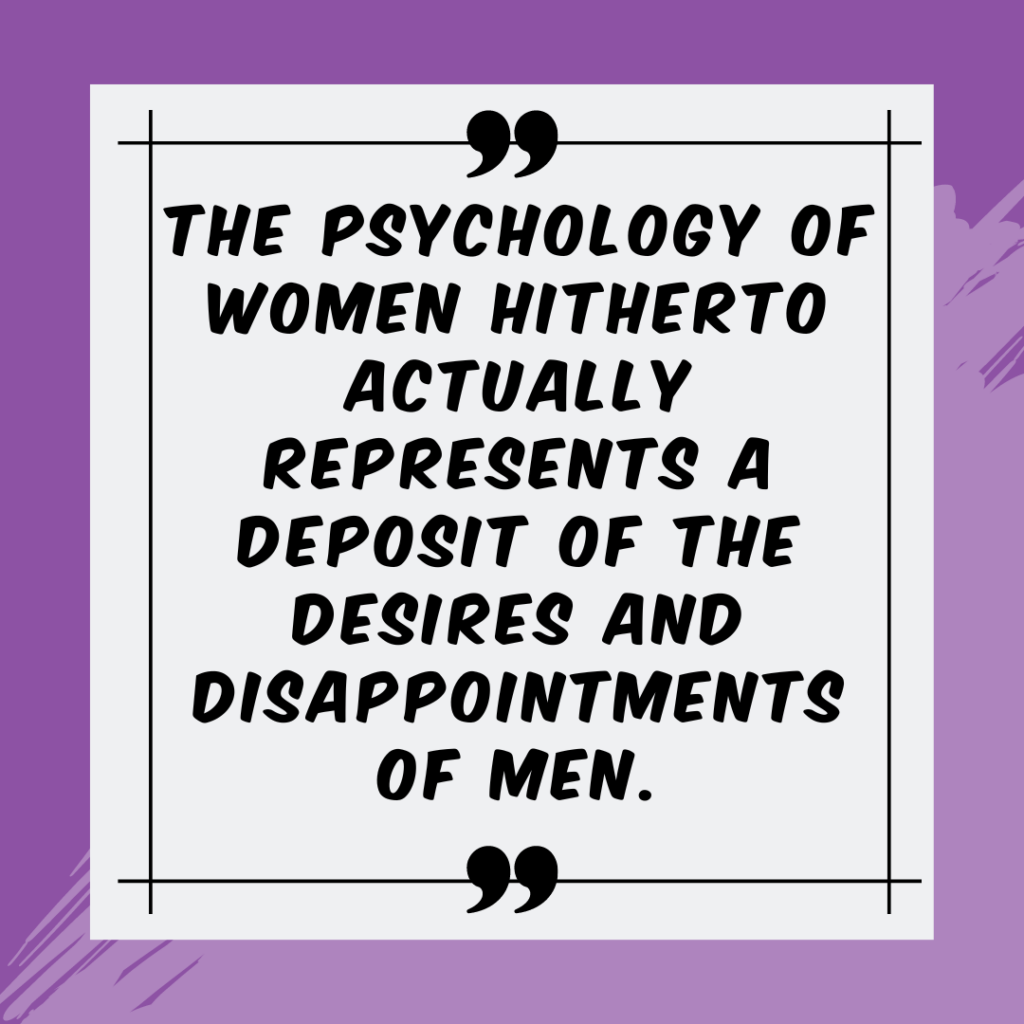This post may include affiliate links, which means we make a small commission on any sales. This commission helps Feminist Book Club pay our contributors, so thanks for supporting small, independent media!
Karen Horney was a founding mother of Feminist Psychology, voiced her differing opinions on Freud, and lived a dynamic life. Here’s her life, and what we can learn from her.
Horney was born Karen Danielsen in 1885, near Hamburg, Germany. According to A Mind of Her Own: The Life of Karen Horney (1988), Horney’s father was largely absent due to his job with a shipping company, and her attractive mother required constant validation.
Starting from age 13, Horney documented her life as a young woman through journaling. Early on, she developed a fascination with introspection and deep personal analysis. Using herself as a subject, she charted her own mood swings and defined her moral boundaries. As a teen she wrote, “Thou shalt free thyself from convention, from everyday morality,” a statement in line with the experience of adolescence.
Her Work
In the broad field of psychology, Horney was able to carve out a space for herself. In her book, Feminine Psychology, a collection of articles Horney wrote on the subject from 1922–1937, she addressed previously held beliefs about women, relationships, and the effect of society on female psychology.
Karen Horney also critiqued some key aspects of Freudian theory. Horney challenged Freud’s concept of “penis envy” as a central factor in female psychology. While Freud believed that women experienced feelings of inferiority due to their lack of a penis, Horney argued that women’s psychological development was more influenced by social and cultural factors, such as societal expectations and gender roles. Horney also disagreed with Freud’s Oedipus complex theory, which proposed that young boys experience unconscious sexual desires for their mothers and rivalry with their fathers. Horney argued that the parent-child relationship is more complex and varied, and she believed that children’s experiences with their parents could have a more profound impact on their psychological development.
New Theory
She proposed a new theory: womb envy. Maybe it wasn’t so much that women coveted men’s power, but that men secretly harbored feelings of inferiority at their inability to nurture and produce human life. Now that was power. Karen Horney’s body of work was a good foundation for feminist psychology and is still resonant to this day. She’s been cited by many modern psychologists.
Karen Horney is among psychologists that emphasizes social interactions as the principal defining factor in formation of the human personality. She called on other psychoanalysts to focus on social backgrounds where people grow up in. In contrast to Freud’s focus on biological and instinctual drives, Horney emphasized the significance of cultural and social influences in shaping individual psychology. She believed that societal pressures, cultural expectations, and gender roles played a crucial role in determining psychological development and well-being.

Overall, Horney’s arguments with Freud challenged the deterministic and biological emphasis of Freudian theory, advocating for a more comprehensive understanding of human psychology that incorporates cultural, social, and interpersonal factors.
Key Takeaways from Horney
- Self-Realization: Horney advocated for the concept of self-realization, which involves individuals striving to become their authentic selves. She emphasized the importance of self-awareness, self-acceptance, and personal growth. She encouraged individuals to pursue their true desires and aspirations rather than conforming to societal expectations. We can learn so much about ourself when we do the work to grow.
- Inner Harmony: Horney was optimistic and emphasized the importance of compassion and empathy. These traits help in understanding and helping individuals with psychological struggles.
- Relational Perspective: Horney stressed the significance of interpersonal relationships in shaping an individual’s psychological well-being. She emphasized the importance of establishing healthy connections, fostering empathy, and promoting mutual growth and support in relationships. This highlights the importance of building healthy social connections for overall mental health.

